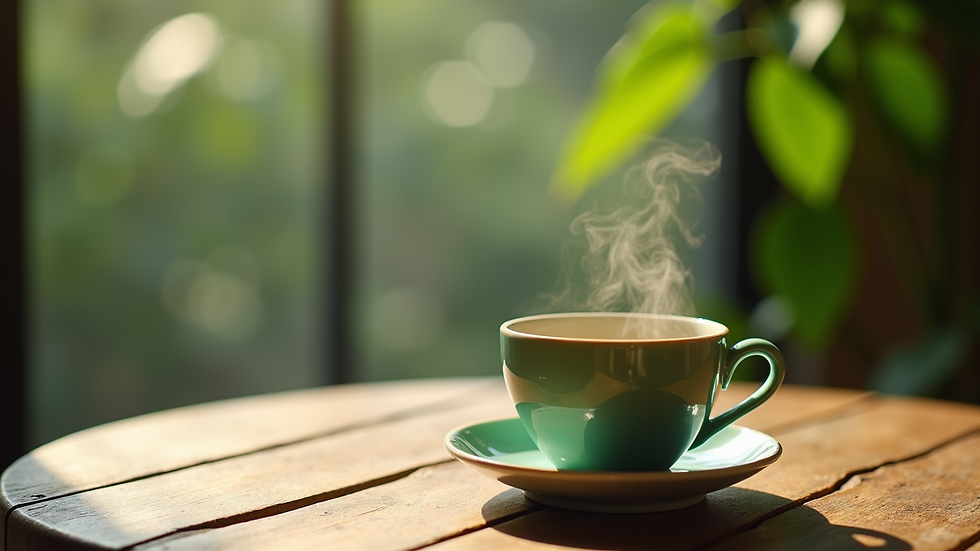Understanding Caffeine in White Tea: What You Need to Know
- A Steep In Time
- Nov 25, 2025
- 4 min read
White tea is often praised for its delicate flavor and numerous health benefits. But if you are sensitive to caffeine or simply curious about how much caffeine is in your cup, understanding caffeine in white tea is essential. This article will explore the caffeine content in white tea, how it compares to other teas, and what factors influence its caffeine levels.
What Is Caffeine in White Tea?
Caffeine is a natural stimulant found in many plants, including tea leaves. White tea is made from the young leaves and buds of the Camellia sinensis plant, which contain caffeine. However, the amount of caffeine in white tea is generally lower than in black or green teas.
The caffeine in white tea can vary depending on several factors:
Type of white tea: Different varieties like Silver Needle or White Peony have different caffeine levels.
Harvest time: Younger leaves tend to have more caffeine.
Processing method: White tea is minimally processed, which can affect caffeine retention.
Brewing time and temperature: Longer steeping and hotter water extract more caffeine.
On average, an 8-ounce cup of white tea contains about 15-30 milligrams of caffeine. This is less than black tea (40-70 mg) and coffee (95-200 mg), making white tea a gentler option for those looking to reduce caffeine intake.

Exploring Caffeine in White Tea: How Much Is Too Much?
Understanding caffeine in white tea helps you manage your daily caffeine consumption. While white tea has less caffeine than other teas, drinking multiple cups can add up. Here are some practical tips to keep your caffeine intake balanced:
Limit steeping time: Steeping white tea for 2-3 minutes extracts enough flavor and caffeine without making it too strong.
Use cooler water: Brewing at around 160-185°F (70-85°C) reduces caffeine extraction compared to boiling water.
Choose your white tea variety wisely: Silver Needle tends to have slightly higher caffeine than White Peony.
Monitor your total caffeine intake: Combine your white tea consumption with other caffeinated beverages to stay within recommended limits (generally 400 mg per day for healthy adults).
If you want to learn more about the specific white tea caffeine content, this resource offers detailed insights and comparisons.
Does White Tea Keep You Awake?
One common question is whether white tea can keep you awake. Since it contains caffeine, it can have a mild stimulating effect. However, because the caffeine content is relatively low, white tea is less likely to cause jitters or interfere with sleep compared to coffee or black tea.
Here are some points to consider:
Individual sensitivity: People vary in how caffeine affects them. Some may feel alert after a cup of white tea, while others may not notice much difference.
Time of consumption: Drinking white tea earlier in the day reduces the chance of sleep disruption.
Amount consumed: A single cup is unlikely to cause sleeplessness, but multiple cups late in the day might.
If you are sensitive to caffeine or have trouble sleeping, it is best to avoid white tea in the late afternoon or evening.

Comparing White Tea Caffeine to Other Teas and Coffee
To put caffeine in white tea into perspective, let's compare it with other popular beverages:
| Beverage | Average Caffeine per 8 oz (mg) |
|----------------|-------------------------------|
| White Tea | 15-30 |
| Green Tea | 20-45 |
| Black Tea | 40-70 |
| Coffee | 95-200 |
| Decaf Coffee | 2-5 |
As you can see, white tea generally has the lowest caffeine content among traditional teas. This makes it a great choice for those who want a mild caffeine boost without the intensity of coffee or black tea.
How to Brew White Tea for Optimal Flavor and Caffeine Control
Brewing white tea properly is key to enjoying its subtle flavors and controlling caffeine levels. Follow these steps for the best results:
Use fresh, high-quality white tea leaves: Look for reputable brands or loose leaf options.
Heat water to 160-185°F (70-85°C): Avoid boiling water to prevent bitterness and excessive caffeine extraction.
Steep for 2-3 minutes: Adjust steeping time based on your taste preference and caffeine sensitivity.
Use about 2 grams of tea per 8 ounces of water: This is roughly one teaspoon of loose leaf tea.
Avoid over-steeping: Longer steeping times increase caffeine and bitterness.
Experiment with these variables to find your perfect cup. Remember, shorter steeping and cooler water reduce caffeine, while longer steeping and hotter water increase it.
Final Thoughts on Caffeine in White Tea
White tea offers a gentle caffeine boost with a delicate flavor profile. Its lower caffeine content compared to other teas and coffee makes it an excellent choice for those seeking a mild stimulant without the jitters. By understanding the factors that influence caffeine in white tea, you can enjoy this beverage while managing your caffeine intake effectively.
Whether you want to relax with a soothing cup or need a light pick-me-up, white tea provides a versatile option. Try different varieties and brewing methods to discover what works best for you.
For more detailed information on white tea caffeine content, be sure to explore trusted tea resources and enjoy your tea journey with confidence.




Comments